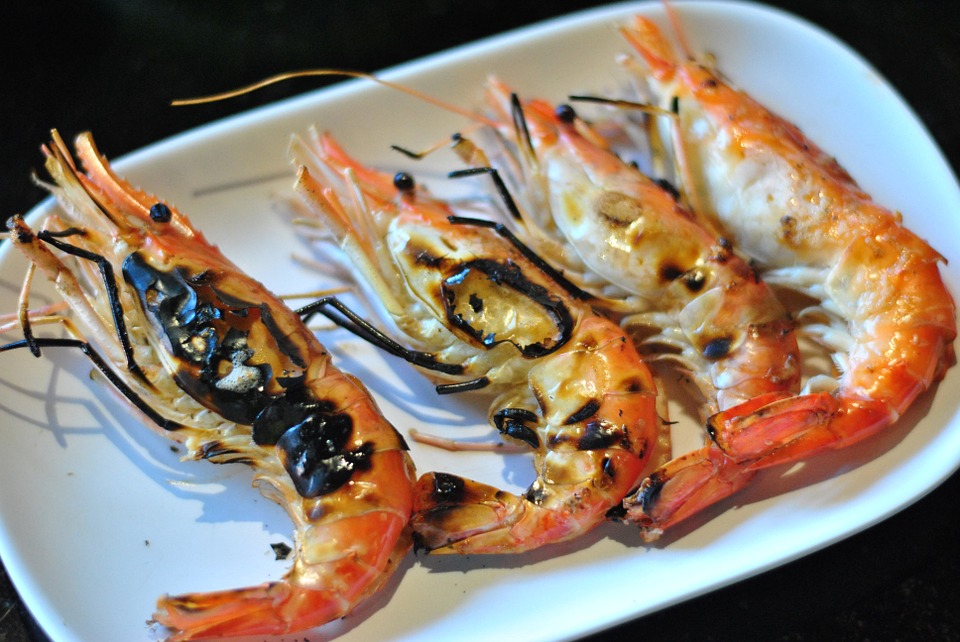The allure of a juicy, succulent shrimp may tempt you to share your seafood feast with your feline companion. But before you offer a bite to your curious cat, it's essential to understand the potential benefits and risks involved. This article delves into the world of feline nutrition and explores whether shrimp is a suitable treat for your furry friend. We'll examine the nutritional value of shrimp, potential risks like allergies and digestive issues, and provide safe guidelines for introducing this seafood treat into your cat's diet.
Part 1: Navigating the World of Feline Nutrition

1.1: The Obligate Carnivore
Cats, unlike humans, are obligate carnivores. This means their bodies are specifically designed to thrive on a diet rich in animal-based protein. Their digestive systems are optimized to break down and absorb nutrients from meat, poultry, and fish, which are essential for their health and well-being.
1.2: Essential Nutrients for Feline Health
- Protein: The building block of muscle, tissue repair, and overall growth. Cats require a high protein intake to maintain their lean muscle mass and support vital bodily functions.
- Fat: Essential for energy production, hormone synthesis, and nutrient absorption. Fats also contribute to a healthy skin and coat.
- Taurine: An amino acid vital for heart function, vision, and reproductive health. Cats cannot synthesize taurine on their own, so it must be obtained through their diet.
- Arginine: Another essential amino acid involved in wound healing, immune function, and nitrogen metabolism.
- Vitamin A: Crucial for vision, immune function, and maintaining healthy skin and coat.
1.3: Understanding Commercial Cat Food
Commercial cat food formulas are carefully crafted to meet the specific nutritional requirements of cats. They provide a balanced blend of protein, fat, essential vitamins, and minerals to support overall health. While these formulas are generally sufficient, occasional treats can be offered in moderation, provided they are chosen carefully.
Part 2: Delving into the Nutritional Value of Shrimp

2.1: Protein Powerhouse
Shrimp is a lean source of protein, providing essential amino acids like taurine and arginine. These nutrients are crucial for maintaining muscle mass, supporting heart function, and promoting overall well-being in cats.
2.2: Omega-3 Fatty Acid Benefits
Shrimp contains omega-3 fatty acids, which are known for their numerous health benefits. These fatty acids can promote healthy skin and coat, reduce inflammation, and support brain function. They may also be beneficial for cats with certain skin conditions or allergies.
2.3: A Source of Vitamins and Minerals
Shrimp is rich in various minerals, including selenium, zinc, and phosphorus, which are essential for bone health, immune function, and energy production. It also provides vitamins like vitamin B12, crucial for red blood cell formation and nerve function.
Part 3: Navigating Potential Risks Associated with Shrimp
3.1: The Threat of Allergies
Just like humans, cats can develop allergies to seafood, including shrimp. Symptoms can range from mild digestive upset like vomiting and diarrhoea to more severe reactions such as hives, itching, and difficulty breathing. If you suspect your cat may be allergic to shrimp, it's crucial to seek veterinary guidance for proper diagnosis and treatment.
3.2: Shellfish Sensitivity
Some cats may experience adverse reactions to shellfish due to a sensitivity to certain components in their shells. Even though the shell is typically removed before consumption, there might be traces of these components in the shrimp's flesh. It's important to observe your cat closely after offering them shrimp and seek veterinary advice if you notice any adverse reactions.
3.3: Digestive Considerations
Shrimp can be challenging for some cats to digest, especially if they are not accustomed to seafood. This can lead to digestive upset, including vomiting, diarrhoea, and gas. It's recommended to introduce shrimp gradually and in small amounts, monitoring your cat closely for any signs of discomfort.
3.4: Mercury Content: A Matter of Concern
Shrimp can accumulate mercury, particularly larger, older shrimp. While the mercury content in shrimp is generally low, it's essential to choose smaller shrimp and limit the frequency of offering it to your cat to minimise the risk of mercury exposure.
Part 4: Safe Ways to Introduce Shrimp to Your Feline Friend
4.1: Cooking and Preparation
Always cook shrimp thoroughly before feeding it to your cat. Raw or undercooked shrimp can pose a risk of bacterial contamination and parasites. Remove the shell and any inedible parts before offering the shrimp to your cat.
4.2: Gradual Introduction is Key
Start by offering a small amount of cooked, plain shrimp to your cat. Observe their reaction carefully, monitoring for any signs of digestive upset or allergy. If they tolerate it well, you can gradually increase the amount over several days.
4.3: Moderation is Essential
Shrimp should be offered as an occasional treat, not a regular part of your cat's diet. Excessive consumption of shrimp can lead to dietary imbalances and potential health problems.
4.4: Choosing the Right Type of Shrimp
When selecting shrimp for your cat, opt for smaller shrimp, as they tend to have lower mercury content. Avoid shrimp that has been marinated or seasoned with additives or spices, as these can be harmful to cats.
Part 5: Exploring Alternatives to Shrimp
If your cat is allergic to shrimp or you prefer to avoid offering seafood, there are other healthy and palatable alternatives. Consider offering cooked chicken, turkey, fish like salmon or tuna, or lean ground beef as occasional treats.
Part 6: The Importance of Consulting Your Veterinarian
Always consult your veterinarian before introducing any new foods to your cat's diet, including shrimp. They can assess your cat's individual health needs and provide personalized dietary recommendations. They can also advise on appropriate portions and frequency of feeding for safe and healthy snacking.
Part 7: Addressing Common Concerns
7.1: Can cats eat raw shrimp?
No, it is not safe for cats to eat raw shrimp. Raw seafood can contain harmful bacteria and parasites that can make your cat ill. It's essential to always cook shrimp thoroughly before giving it to your cat.
7.2: Is cooked shrimp safe for kittens?
It's best to avoid offering shrimp to kittens, as their digestive systems are still developing. Introducing new foods too early can cause digestive upset or allergies.
7.3: Can cats eat shrimp tails?
No, shrimp tails are not suitable for cats. They are hard and sharp and can pose a choking hazard. It's best to remove the tail before feeding shrimp to your cat.
7.4: How often can I give my cat shrimp?
Shrimp should be offered as an occasional treat, not a regular part of your cat's diet. Limit the frequency to once or twice a week, at most.
7.5: Can cats eat shrimp with the shell?
No, cats should not eat shrimp with the shell. The shell is indigestible and can cause digestive upset or blockages in their digestive system. Always remove the shell before feeding shrimp to your cat.
7.6: What if my cat has an allergic reaction to shrimp?
If your cat experiences any allergic reaction to shrimp, such as vomiting, diarrhoea, or hives, stop feeding it to them immediately. Consult your veterinarian for diagnosis and treatment.
7.7: What are some signs that my cat is allergic to shrimp?
Signs of a shrimp allergy in cats can include:
- Vomiting
- Diarrhoea
- Hives
- Itching
- Swelling
- Difficulty breathing
If you suspect your cat may be allergic to shrimp, consult your veterinarian immediately.
Everyone is watching

Are Cat Ribs Flexible? Understanding Their Anatomy
CATS & KITTENSThis article delves into the fascinating world of feline anatomy, exploring the flexibility of cat ribs and ho...

Can Cats Eat Bananas? (Everything You Need to Know)
CATS & KITTENSThis article dives into the intriguing question of whether cats can safely enjoy the sweet, yellow fruit, bana...

Cat Lifespan: How Long Do Cats Live?
CATS & KITTENSThis comprehensive guide explores the factors influencing the lifespan of our feline companions, providing ins...

Can Cats Get COVID-19? What You Need to Know
CATS & KITTENSThis article will delve into the fascinating world of feline COVID-19 susceptibility. We'll explore whether ca...

Can Cats Eat Eggs? A Complete Guide to Egg Safety for Your Feline Friend
CATS & KITTENSWhen it comes to treating our furry companions, we all want to ensure we're doing what's best for them. Eggs...
